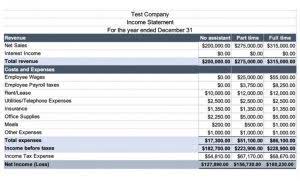Bookkeeping
Mastering Accounting for Tech Companies: The Ultimate Guide to Industry Accounting in the Technology Sector

With the right accounting technology in place, accountants can automate manual activities, saving them precious time and money while also improving accuracy, enabling collaboration and work/life balance and boosting staff and client engagement levels. From enabling online ordering to facilitating remote work to overcoming labor shortages, technology can streamline accounting processes, improve the customer experience, and help scale businesses—even amidst a challenging backdrop. The explosion in data that has launched the Fourth Industrial Revolution, an era when business will be transformed by cyber-physical systems, has enabled several technology trends to develop. Every business can leverage these important trends and should pay attention to how best to use them, but accountants should really evaluate how these six technologies can be used strategically to achieve the company’s business strategy.
Mastering Accounting for Tech Companies: The Ultimate Guide to Industry Accounting in the Technology Sector

This makes sure that a company’s financial reports are fair and follow regulatory requirements. Implement our API within your platform to provide your clients with accounting services. As accounting procedures become more digital, cybersecurity becomes a paramount concern. Organizations must heavily invest in robust cybersecurity measures, implement security protocols, and continuously accounting for technology companies educate teams on cybersecurity best practices to mitigate evolving cyber threats. One of the most significant challenges technology entities encounter in applying the leasing standard is to determine which arrangements contain leases. Navigating the inventory accounting guidance is key for many technology entities, particularly those that sell hardware and components.

How do APIs work in accounting technology?
- Withum and Teachable have been working together for a relatively short time, but a solid relationship has been built to prepare Teachable for getting to that next level of growth whether it be a new funding round or even an IPO.
- In the world of tech companies, especially those offering software as a service (SaaS), the accounting team acts as the control panel.
- Download our list of 21 Most Overlooked Tax Deductions and Credits to find out if you’re losing money.
- It’s entirely possible organizations will make use of strategic outsourcing to “fill the gaps” in their tech tree or secure the training and tools necessary to add capabilities to their own team.
- Look for an established accounting technology provider that offers solutions designed specifically for accounting firms.
In short, accounting technology enables accountants to focus less on tax return preparation and more on the value they provide to their clients. Due to this complexity, many tech companies outsource their accounting to an external vendor. These outsourced accounting firms offer tech companies access to well-established accounting processes, proven financial leadership, and highly-skilled professionals. Modern accounting requires a blend of technologies, including accounting software, cloud computing, APIs for integration, data analytics tools, and cybersecurity measures.
Building a digital-first workplace
For example, you can track and approve invoice progress using some accounting software tools. Similarly, you can use it to validate and verify information that you receive from suppliers and other businesses to make sure that everything lines up. From transformational accounting practices spearheaded by blockchain, to new ways of working in the wake of the pandemic, accountancy is going to see some serious upheaval in 2024 and beyond.
Outsourced accounting means hiring a company outside of your own to take care of money matters. This can be better than in-house accounting because it saves time and lets tech companies focus on making cool stuff. Robust accounting from https://www.bookstime.com/ experts can help tech companies ensure compliance with tax laws to avoid problems. Adopting GAAP financials isn’t only a sign of financial maturity, it’s a way to gain much more insight into the financial performance of a company.
- According to a Robert Half survey, 71% of managers in the U.S. are either already using some kind of virtual reality or planning to integrate it within three to five years.
- In order to understand, quantify and report on this new language of business, accountants have had to adopt advanced technologies themselves in order to carry out their increasingly critical role.
- Furthermore, modern accounting emphasizes real-time data accessibility and integration.
- Get $30 off a tax consultation with a licensed CPA or EA, and we’ll be sure to provide you with a robust, bespoke answer to whatever tax problems you may have.
- GAAP is a set of accounting standards that businesses can choose to follow.
- Reports by ReportLinker and Statista both say that the value of the outsourcing industry could grow as much as $75 trillion between last year and 2027.
Pilot is not a public accounting firm and does not provide services that would require a license to practice public accountancy. To capitalize on faster innovation, more flexible resources, and economies of scale, forward-thinking accountants are taking full advantage of cloud-based accounting technology. From a tax research standpoint, look for accounting technology that includes access to thoroughly integrated and up-to-date tax research materials, editorial insight, productivity tools, online learning, and news updates. With that ability to quickly access trusted answers, you can help clients make confident decisions quickly. From increasing accuracy to optimizing tax workflow to freeing up time for more value-added activities, technology has transformed the accounting industry—for the better.

The Future Of Accounting: How Will Digital Transformation Impact Accountants?
- Once blockchain is widely adopted, and challenges around industry regulation are overcome, it will benefit businesses by reducing costs, increasing traceability, and enhancing security.
- Every business can leverage these important trends and should pay attention to how best to use them, but accountants should really evaluate how these six technologies can be used strategically to achieve the company’s business strategy.
- Blockchain enables smart contracts, protecting and transferring ownership of assets, verifying people’s identities and credentials, and more.
- Now that streamlining tools can handle the boring parts, employees will find the soft skills more important than ever.
- It’s a way to securely store and accurately record data, which has broad applications in accounting and financial records.
- AI algorithms allow machines to take over time-consuming, repetitive, and redundant tasks.

